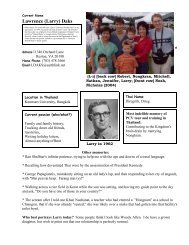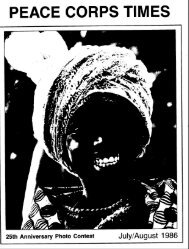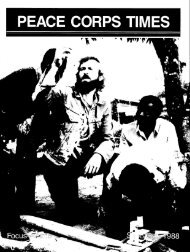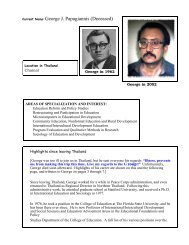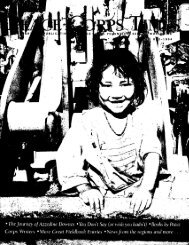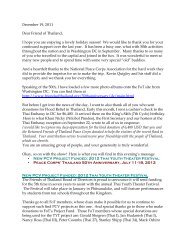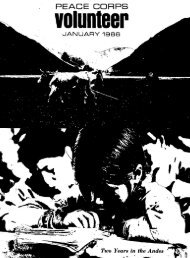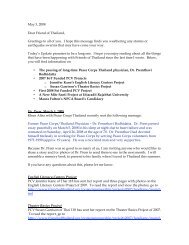TIMES
Peace Corps Times - March/April 1985 - Peace Corps Online
Peace Corps Times - March/April 1985 - Peace Corps Online
- No tags were found...
Create successful ePaper yourself
Turn your PDF publications into a flip-book with our unique Google optimized e-Paper software.
Special Education in Marrakech<br />
This article was written by Anne Bishop<br />
and Bill Burns, PCVs in Marrakech, Morocco.<br />
Bishop, a resident of Maryland,<br />
graduated from Pomona College and previously<br />
served as a TEFL Volunteer in<br />
Morocco before this assignment. Burns, a<br />
native of New York state, received his degree<br />
in special education from Seattle University.<br />
For s~ecial education to take root in<br />
any culture, attitudes must change<br />
and public awareness must increase.<br />
These are lofty goals to be sure. One<br />
need onlv look at the United States to<br />
see that years and years of unrelenting<br />
effort went into the process<br />
of shifting attitudes towards the disabled<br />
and establishing a solid public<br />
base from which educational opportunities<br />
could arise. This process, of<br />
course, is on-going, so to think that in<br />
a country like Morocco, though more<br />
developed than many emerging nations,<br />
we can effect changes in a<br />
matter of vears is illusorv. we must<br />
be enormously patient and understand<br />
that the ideals which fuel our<br />
efforts and enthusiasm now mav<br />
not be realized for many years to<br />
come. Undoubtedly, many Volunteers<br />
throughout the world face these<br />
same frustrations and challengesu<br />
whatever their endeavors may be. But<br />
they must also feel, as we do, that<br />
keeping these thoughts in mind on a<br />
day to day basis is often nearly impossible.<br />
Last September, we started a small<br />
school for children with cerebral<br />
palsy in a hospital in Marrakech. It is<br />
the first program of its kind in<br />
Morocco. The idea for such a school<br />
was originally conceived by Dr. Karim<br />
Kabbaj, medicine chief of the hospital,<br />
and PCV, Karen Burgess, a physical<br />
therapist. Together, they planned<br />
a summer "camp" for children with<br />
cerebral palsy and Peace Corps provided<br />
two Volunteers.<br />
The present program is an outgrowth<br />
of that experiment, and we<br />
now work with about twenty-five children<br />
a week ranging in age from<br />
eighteen months to fourteen years.<br />
Some of our students are mentally<br />
"normal" but need assistance with<br />
their physical development; others<br />
are severely mentally retarded and totally<br />
dependent on others.<br />
Compared to many development<br />
projects, ours is particularly abstract;<br />
the results of our efforts are less tangible<br />
than most, and our work is<br />
never really finished. Progress is not<br />
measured by the number of wells<br />
dug, crops harvested, trees planted,<br />
etc., but rather by a child's ability to<br />
lift an arm that much higher, maintain<br />
eye contact that much longer, respond<br />
to sights and sounds that much<br />
better.<br />
Working with disabled children<br />
and their families is often frustrating.<br />
Many people have come to us looking<br />
for "cures" and "miracles" that we, as<br />
Bill Bum (left) and Anne Bishop (second from right) with their students at a Marrakech<br />
hospital.<br />
Bill B um helps a child to stand.<br />
Westerners are supposedly able to<br />
provide. Eventually some begin to realize<br />
the limits of our abilities, yet they<br />
remain supportive and realistically<br />
hopeful. These are the people with<br />
whom we have been able to wbrk most<br />
effectivelv. Their dedication and willingness<br />
to do their part inspire us and<br />
rejuvenate ' our sometimes sagging<br />
souls. One mother faithfully brings<br />
her son to us and rarelv misses her<br />
scheduled time. Over thk past seven<br />
months, her enthusiasm has grown as<br />
her son has begun to respond to our<br />
efforts. Another one of our students<br />
has begun standing and walking with<br />
assistance, and we hope she will soon<br />
be walking on her own. It is difficult<br />
u<br />
to relay the feelings of wonder and<br />
satisfaction that our work gives us.<br />
Suffice it to say that being around<br />
children when they begin to realize<br />
their potential is one of the most exciting<br />
experiences one can have. In a<br />
sense we are pioneering, opening<br />
doors to new possibilities that otherwise<br />
would have been closed to many<br />
of our students.<br />
It is not difficult to understand<br />
why, until recently, few educational<br />
opportunities existed for Morocco's<br />
disabled. Traditionally, education in<br />
Morocco has been a community affair.<br />
Parents, neighbors, relatives, religious<br />
leaders and teachers all take<br />
part in educating a child. Moroccans<br />
feel responsibility towards their<br />
handicapped citizens, for inherent in<br />
the Islamic religion is the belief that<br />
every Muslim must be "charitable" to<br />
(continued on page 12)<br />
Peace Corps Times 1 1



